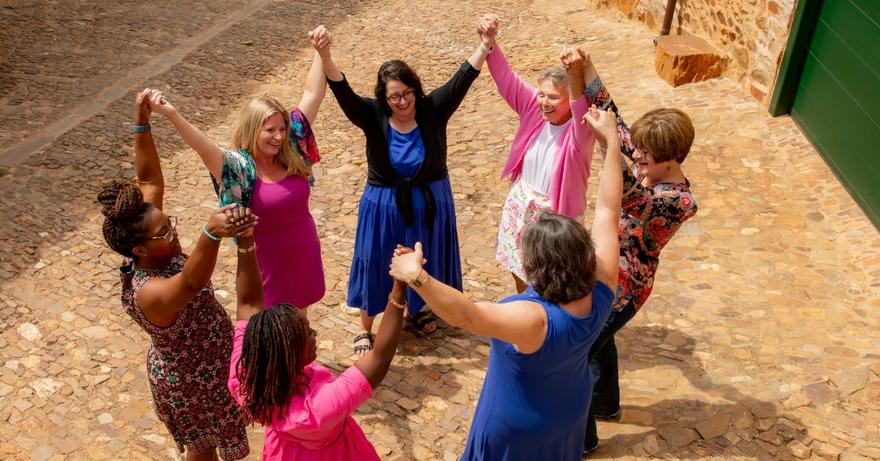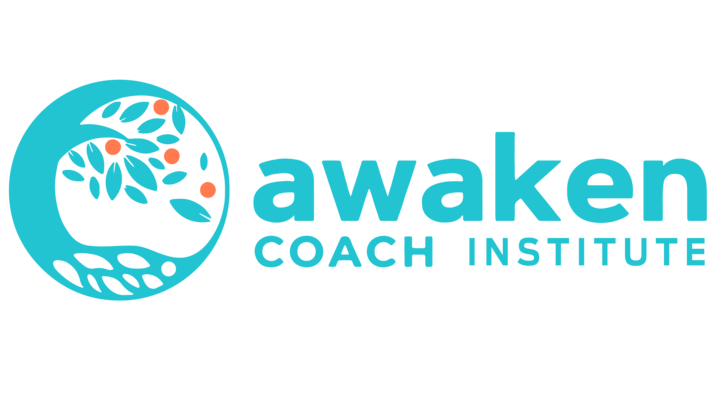I Thought I Didn’t Know How to Create Love in a Community. I Was Wrong.

When I first founded Awaken Coach Institute, I had a clear vision for what we could become—a place where people grow as coaches and as human beings. But I secretly worried about one thing—the only thing that truly matters to me: could I really co-create a space of love and belonging in a community (without starting a cult)?
It felt too big, too mysterious. Love in community felt like a gift other people knew how to give—charismatic leaders, social geniuses, the spiritual teachers of the world.
But as our community has grown, I've realized something surprising: I do know how to co-create love in our community. Not only is it an innate superpower, it's also something I’ve been learning my whole life, and I believe it's teachable.
I’ve studied the deep, liberating wisdom of Dr. Martin Luther King Jr., whose principles of beloved community are rooted in the dignity of all people, and which I'm incorporating more deeply in my soul every day.
I’ve leaned into Peter Block’s practical wisdom in Community: The Structure of Belonging, where he lays out the six pillars of community: invitation, possibility, ownership, dissent, commitment, and gifts.
And I’ve followed a lifelong fascination with what makes people feel seen, safe, and celebrated—what makes us belong not despite our uniqueness, but because of it. Community and uniqueness are not opposites - they're interdependent polarities.
Here are a few principles that now guide how I hold space for community at Awaken:
1. Welcome difference
Community begins with extending a heartfelt invitation that welcomes people as they are, not as we wish them to be.
Belonging doesn’t mean being the same, or fitting in. It means being welcomed as you are. One of the greatest gifts we can give each other is the freedom to show up whole—messy, brilliant, uncertain, weird. In our community, difference is not only allowed—it’s invited, cherished, and honored. Sometimes people in our community think they need to be like me. My answer: you need to be exactly YOU.
Practical examples:
- Before each cohort begins, we introduce ourselves by email. The introductory email includes the question, "How have you felt OTHER?" We get the most fascinating replies.
- On day one of class, we place ourselves in a metaphoric, richly-imagined landscape - and we're explicit that wherever you find yourself in that landscape is OK because we'll build bridges to one another.
2. Focus on possibility
In community-building, we shift from problem-solving to dreaming, by focusing on what we can create together, rather than what’s broken. That's the very nature of coaching, so it's engrained in everything we do.
Practical examples:
- At the beginning of each class, and in preparation, we invite the question, "What do you most want to learn?" We don't spend time teaching what isn't immediately salient, which means most of our classes are taught by the wisdom of the participants - it's hearing their own voices that makes the learning come alive.
- When we teach about agreement-setting, which is one of the core coaching skills, we teach that it's more important to engage the imagination than it is to get practical at the start of a session. What would you REALLY want, if there were no fears or obstacles? And what's the even BIGGER dream than that?
3. Ownership by inviting everyone to contribute from their gifts
Belonging grows when people feel needed. Not just included, but essential. I’ve learned to ask: “What do you love to bring?” instead of “How can you fit in?” People don’t want to be fixed. They want to be invited.
Rather than fixating on deficiencies, community thrives when we recognize and celebrate the unique gifts each person brings.
Practical examples:
- On day one of class, I will always ask someone to help me out, within the first few minutes. Either I'll need someone to help me with the breakout rooms, lead us in a stretch, help me check my mic, or some other small, symbolic gesture that lets people know I am looking for contribution - I'm not there just to offer wisdom, but to build it collectively. I make sure I hear everyone's voice, quite literally.
- On our inner team, I invite as much choice as possible. There are plenty of jobs to do - responding to participant worksheets, facilitating class, grading exams, writing social media posts, organizing events.... and it's my pleasure when people do only the jobs they're delighted to do. (I'm slowly learning that for myself - I'm always excited to teach something on video, and have never experienced joy from looking at financial spreadsheets. That's going to mean more videos and fewer spreadsheets for me!)
3. Let truth and dissent belong
Real love doesn’t silence discomfort. Our spaces allow room for hard truths, vulnerable edges, and disagreements. We practice love by holding paradoxes: strength and softness, unity and difference, love and accountability. This one is a hard one for me, coming from a family in which dissent was punished, but it may be the most important.
Practical examples:
- I remember in one group we were discussing our Awaken Standards of Presence, which includes my request that no one use the chat feature while someone else is talking (and I have reasons for that which become clear when we get into the heart of the course, where listening has gotten DEEEEEEP). Someone bravely and tearfully said they were frustrated about that because they count on the chat feature when they find speaking difficult. What unfolded was a rich, honoring conversation. We came up with creative solutions that met our shared values.
- I always hope someone will disagree with me, or someone on our faculty team, as early as possible. My warm invitation to discuss further sets the tone for the rest of our time.
4. Trust the Invisible Thread
There’s a sacred thread that runs between people when they gather with open hearts. I firmly believe that the core in the center of the human is love, so connecting with the real person (as well as whichever of their toddler or teenage parts appears to be taking the lead in any given moment) will invariably produce goodness.
You might not measure or manufacture love. But you can nurture it—with presence, trust, and a gentle sense of wonder. There's nothing more important than a rock-solid belief that whoever I'm with does NOT need me to fix them - they are already OK. They are powerful. When they connect with the core of themselves, they'll know it, too.
Practical examples:
-
Someone showed up in class appearing withdrawn and skeptical. Instead of pushing for engagement, I trusted the deeper wisdom at play—that just their presence is enough for now. I knew there was an invisible thread connecting them to the space, just because they were here. Later, weeks down the line, they opened up in a powerful way, sharing that it was the non-pressured welcome that kept them coming back and made them feel safe to belong.

2 comments
Christi, this is incredibly inspiring this morning as I have my morning tea and contemplate the breakthroughs I had in a coaching session this weekend. It is my intention to create community in an environment that is at times openly hostile to the idea and at a minimum is not historically open to the idea. Thank you for the inspiration that as long as we show up in love and bravery anything is possible. I am so grateful I found this community that you have created. *Don't let the "Kristen" confuse anyone, this is Drew :)
Leave a comment
Please log in or register to post a comment